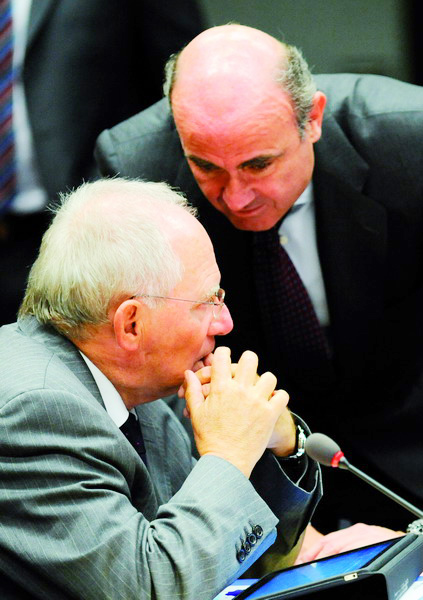Hands still being held out for Chinese help
17 january 2013

German Finance Minister Wolfgang Schaeuble (left) speaks with Spanish Finance Minister Luis de Guindos before a European Stability Mechanism followed by a Eurogroup Council meeting in Luxembourg. [Photo / Agencies]
The establishment of the European Stability Mechanism comes with warnings from experts
Brussels will continue to look to Beijing to bolster the European Stability Mechanism, the long-awaited permanent financial firewall inaugurated on Monday, China observers say.
But they have warned that Beijing needs to be wary even though the European Union and China reached a consensus recently that Beijing would buy more bonds when the mechanism came into effect.
“Beijing still needs to look carefully at the limits of key European states in backing such mechanisms and then determine how much support it is willing to give,” says Gregory Chin, professor at York University in Toronto and China research chair of the Center of International Governance Innovation.
On Monday, Brussels put the ESM into effect, with a maximum lending capacity of 500 billion euros ($642 billion), after prolonged debate in the EU. But the total capital contribution of from 17 eurozone countries will be only 80 billion euros, to be offered in phases. Germany will contribute 27 percent of that, and France, Italy and the Netherlands will also be big contributors.
Chin says the ESM’s establishment is a breakthrough in a process of creating new regional-level international governance mechanisms for the Europeans, one he says is clearly needed.
“The response has been too slow in coming, but better late than never, I guess,” Chin says.
For China the big question in helping to finance this new mechanism is how much governments, particularly Germany’s, are willing to support it.
“The reality behind the eurozone is that key states, nation-states, still matter, ultimately, to keep the project Europe afloat,” Chin says, adding that the limits of the initial financial commitment from European sources for the ESM suggests that this is not yet fully resolved.
“Ultimately, the Europeans must still save Europe, though China can help to further calm the markets.”
Duncan Freeman, a researcher at the Brussels Institute of Contemporary China Studies, also has a warning for Beijing.
“Risk is a key factor for the Chinese government. Since the crisis began, the EU has failed to adopt coherent policies to resolve the problems, and while the ESM is a step forward, China will want greater clarity before committing itself to supporting the ESM in a significant way.”
Brian Lawson, chief global economist at Exclusive Analysis in London, believes the roles of EU member states are essential, compared with Asian creditors such as China and Japan.
“For China, ESM would be a convenient way to buy pooled European risk if it issues debt, but this was already available from its predecessor, European Financial Stability Facility.”
Lawson says that the 80 billion euros of initial capital for the ESM and a further 620 billion euro in collateral commitments give it a stronger capital base than the EFSF, which was based on contingent support from its members.
“Ultimately, however, its strength relies on the larger and stronger eurozone countries, Germany and France. In this regard, little, if anything, has changed.”
Overall, recent developments have reduced the risk of the eurozone rapidly collapsing, he says.
Chin and Lawson are at one in saying it took too long for politicians in Brussels to establish the ESM.

Recent Comments